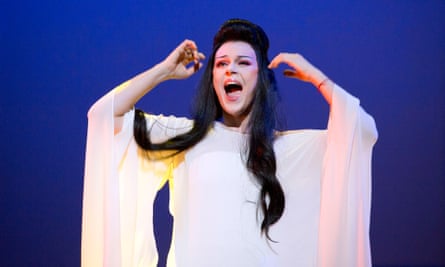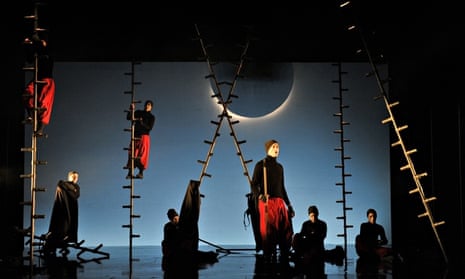There was a magical moment last week in the Royal College of Music’s exceptional production of Handel’s lost opera Giove in Argo when the audience found itself plunged amid the inner workings of the composer’s extraordinary mind. The chorus had crept into the auditorium and, standing on each side, carefully assembled a piece of musical clockwork, turning lines of counterpoint into heavenly harmony as they sang of the joys and pains of love. You could almost hear the cogs moving.
That extraordinary mind perhaps knew more about pain than joy, his genius being so often dismissed by fickle 18th-century audiences, but you have to hand it to him: Handel never gave up, reinventing and recycling his music to meet the whims of the crowd. In 1739, faced with a rival Italian opera outfit opening up across town, he laid aside a season of oratorio and stitched together a pastoral pasticcio using existing material, a sprinkling of new arias and even the work of another composer. It ran for only two performances and was thought lost until skilfully reconstructed by the eminent musicologist John H Roberts. Last week it was heard for the first time on a London stage since 6 May 1739.
Despite its spatchcock genesis, it hangs together well as a piece of drama, particularly when this degree of imagination and vigour is lavished upon it. In a very free adaptation of Ovid, the ever-randy Jove has disguised himself as the shepherd Arete to wander among the mortals. He falls first for the feisty Iside, bent on avenging the murder of her father, and then Calisto, a follower of the goddess Diana, pledged to virginal purity. It takes three acts to sort out the tangle, but under the driving direction of conductor Laurence Cummings and the spirited playing of the London Handel Orchestra, the evening flashed by.
Handel aficionados would have recognised many lifts, particularly the hit aria Tornami a vagheggiar from Alcina (1735), sung with startling agility by Galina Averina in this double-cast production. Her bell-like soprano was tested to the full in the ferocious Combattuta da più venti from Faramondo (1738) but was perfectly at home in the melting Ah! Non son io che parlo from Ezio (1732). Kezia Bienek (Iside) possesses a mezzo voice of rare quality, matched by a natural ability as an actress. She’s off to join the Glyndebourne chorus this summer; expect to hear more of her in the future. Handel’s original Iside was one Costanza Posterla, who, either through lack of rehearsal time or because of an imperious nature, interpolated two arias and a recitative from Francesco Araja’s 1735 opera Lucio Vero. Bienek, when not fighting off the amorous intentions of Gyula Rab’s goaty Arete, made a compelling advocate for Araja’s arresting music.
Designer Molly Einchcomb gave director James Bonas a darkly stylised rural landscape to work in, with plenty of ladder-like “trees” for the cast to clamber up and down and hide behind, all lit with great subtlety by Rob Casey. The chorus plays a larger role in this work than in any of Handel’s 41 Italian operas. Their singing and attractive stylised movement exemplified the depth of quality that ran throughout this remarkable achievement.
The role of Lieutenant Benjamin Franklin Pinkerton is surely among the most repugnant in the operatic repertoire. To modern eyes this US navy officer is an abusive creep; arranging a brief sham marriage to a trusting 15-year-old Japanese girl, abandoning her and then returning years later to take away her one consolation, the child he had unknowingly fathered. What a bastard. How could poor Cio-Cio-San have fallen for him?

The knowledge that Puccini’s Madama Butterfly is based on a true story makes the tragedy even more shocking but also curiously helps explain it to a 21st-century audience, uncomfortably aware that the news brings almost daily revelations of sordid teenage exploitation much closer to home than picturesque Nagasaki in the early 20th century. The real-life Pinkerton was following a well-worn path, where American men would provide a home and a servant to a young Japanese woman on a paid monthly contract, with the sleazy justification that she would eventually earn enough to marry as she would choose.
Puccini and his librettists Giuseppe Giacosa and Luigi Illica make no bones about the iniquity of such a system, and turn what could be a piece of sentimental mush into a powerful statement about arrogant imperialism, cultural difference and shattered illusion. Moshe Leiser and Patrice Caurier’s classic Royal Opera production, currently revived under the meticulous direction of Justin Way, lets the piece speak for itself, content merely for it to look and sound utterly ravishing from start to finish. Christian Fenouillat’s charming set is made up of cool, sliding paper screens, as insubstantial and changing as Pinkerton’s devotion to Butterfly, all bathed in Christophe Forey’s wonderfully evocative lighting design.
Stepping into the shoes of the repellent Pinkerton is the American tenor Brian Jagde, making his ROH debut. He sings with an attractive silvery tone as he dismisses the concerns of US consul Sharpless (the ever-reliable Gabriele Viviani) but we don’t believe his show of remorse at the close. Kristine Opolais, as Butterfly, returns to the role that made her name at Covent Garden in 2011. She is a star. Her delicate tenderness will break your heart.
Star ratings (out of five)
Giove in Argo ****
Madama Butterfly ****

Comments (…)
Sign in or create your Guardian account to join the discussion